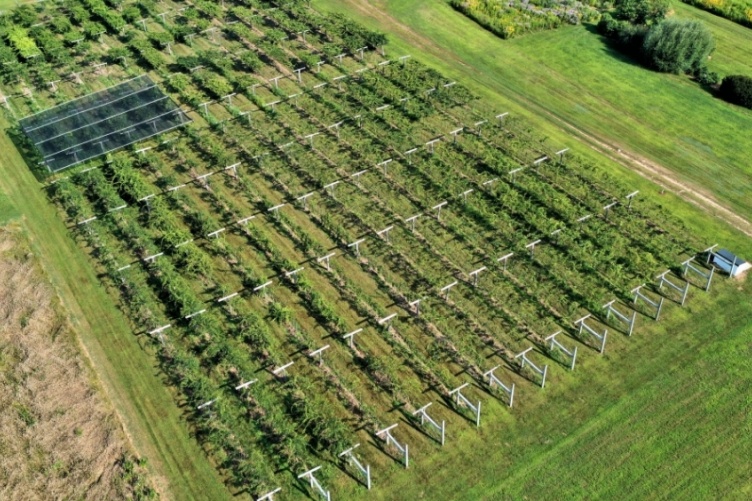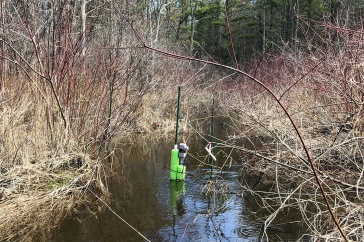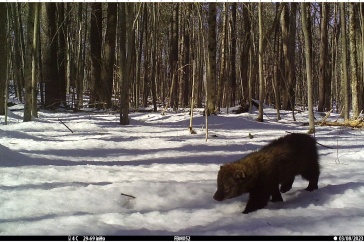
The kiwiberry vineyard at the NH Agricultural Experiment Station’s Woodman Horticultural Research Farm.
 Kiwiberries are tropical-tasting fruits that have grown in the backyards and private gardens of the region for more than 140 years. Granite Staters interested in adopting this long gardening tradition are invited to learn more from UNH’s Kiwiberry Research and Breeding Program experts.
Kiwiberries are tropical-tasting fruits that have grown in the backyards and private gardens of the region for more than 140 years. Granite Staters interested in adopting this long gardening tradition are invited to learn more from UNH’s Kiwiberry Research and Breeding Program experts.
New Hampshire Agricultural Experiment Station researcher Iago Hale, associate professor of specialty crop improvement at UNH, and Will Hastings, manager of UNH’s Kiwiberry Vineyard, will join Ask UNH Extension host Nate Bernitz for “Growing Kiwiberries in New Hampshire Gardens.” Attendees can expect to learn about selecting kiwiberry plants; tips for care throughout the seasons; how to plant and maintain kiwiberry vines; how to train and prune kiwiberries; and strategies for maintaining healthy, productive plants.
To watch and participate, visit the Ask UNH Extension Facebook page (@AskUNHExtension) or UNH Extension Facebook page (@UNHExtension) Thursday, Aug. 27 at 6 p.m. Scroll down to the video, click on it to activate the audio, and join the conversation.
In 2013, Hale established the Kiwiberry Research and Breeding Program at the experiment station’s Woodman Horticultural Research Farm in Durham. Inspired by producer interest, consumer demand, and an opportunity for niche marketing in the region, his aim has been to develop improved, economically viable kiwiberry varieties for small farms in the Northeast.
With their general adaptation to the region’s cooler climate, their attractive appearance, intense and complex flavor profiles, high levels of bioactive compounds, and easy consumability, kiwiberries (Actinidia arguta) have long been recognized for their potential as a high-value crop in New England. Despite their long history of growing in New England, very little commercial production exists.

as a high-value crop in New England.
In recent decades, a few pioneering producers have successfully experimented with field-scale kiwiberry production, demonstrating the commercial viability of the crop and helping to catalyze interest among consumers. However, one of the main barriers to commercial kiwiberry production for regional growers is knowing which varieties available from commercial nurseries are best suited to the region.
As a result, Hale and his team recently partnered with Hartmann's Plant Company of Lacota, Michigan, to genetically fingerprint the company’s kiwiberry inventory in an effort to certify the identity of varieties that Hale and his team have recommended for growing in New England. Now for the first time, growers can source commercially grown kiwiberry plants that have been genetically verified as being recommended to grow in New England by experiment station researchers.
Kiwiberry vines are dioecious plants, which means separate male plants are required to pollinate female plants if they are to bear fruit. Among the regionally recommended fruiting varieties available from Hartmann’s are the female cultivars ‘Geneva 3’ and ‘Ananasnaya’. Also available is a male pollinizer known as ‘Meader Male’, named after UNH botanist and longtime experiment station researcher Elwyn Meader, who selected the variety in the 1970s. Complementing the relatively early flowering time of Meader Male are three other recommended male varieties, namely ‘74-46’, ‘74-52’, and ‘Opitz Male’.
Interest in growing kiwiberries appears to be on the rise in the region. For the first time since the USDA began keeping statistics in 1840, farmers from several Northeast states, including New Hampshire, reported kiwifruit production operations in the 2017 Census of Agriculture, the most recent census.
To support this spreading interest, “Growing Kiwiberries in New England, a Guide for Regional Producers” also now available for beginning kiwiberry growers. The comprehensive online guide, developed by Hale and his team, provides in-depth, regionally relevant, and updated information on the crop. Comprised of a statewide market assessment, a detailed production manual, and an enterprise analysis, the freely available guide can be found at: http://www.noreastkiwiberries.com/
Granite State Gardening episodes air at 6 p.m. Monday and Thursday. Episodes of Granite State Gardening can be viewed at: https://www.facebook.com/AskUNHExtension/playlist/1069125003468156/.
This material is based upon work supported by the NH Agricultural Experiment Station, through joint funding of the National Institute of Food and Agriculture, U.S. Department of Agriculture, under award numbers 233561 and 1006928, and the state of New Hampshire.
Founded in 1887, the NH Agricultural Experiment Station at the UNH College of Life Sciences and Agriculture is UNH’s original research center and an elemental component of New Hampshire's land-grant university heritage and mission. We steward federal and state funding, including support from the USDA National Institute of Food and Agriculture, to provide unbiased and objective research concerning diverse aspects of sustainable agriculture and foods, aquaculture, forest management, and related wildlife, natural resources and rural community topics. We maintain the Woodman and Kingman agronomy and horticultural research farms, the Macfarlane Research Greenhouses, the Fairchild Dairy Teaching and Research Center, and the Organic Dairy Research Farm. Additional properties also provide forage, forests, and woodlands in direct support to research, teaching, and outreach.
The University of New Hampshire is a flagship research university that inspires innovation and transforms lives in our state, nation, and world. More than 16,000 students from all 50 states and 71 countries engage with an award-winning faculty in top ranked programs in business, engineering, law, liberal arts, and the sciences across more than 200 programs of study. UNH’s research portfolio includes partnerships with NASA, NOAA, NSF, and NIH, receiving more than $100 million in competitive external funding every year to further explore and define the frontiers of land, sea, and space.
-
Written By:
Lori Tyler Gula, Ph.D., '19 | NH Agricultural Experiment Station | lori.gula@unh.edu | 603-862-1452
















































